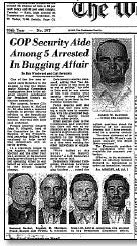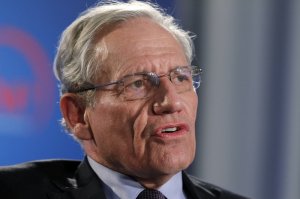It’s long been a misleading element of media lore that the Washington Post was mostly alone in reporting the unfolding scandal of Watergate, which broke nearly 50 years ago and eventually brought down the corrupt presidency of Richard Nixon.
The claim reemerged yesterday in a commentary by the newspaper’s media columnist, Margaret Sullivan. She referred to the Post‘s lead Watergate reporters, Bob Woodward and Carl Bernstein, declaring that they “were almost alone on the story for months.”
Not exactly.
The scandal burst into public view on June 17, 1972, with the arrests of five burglars at the headquarters of the Democratic National Committee at the Watergate complex in Washington, D.C. In the weeks that followed, details about the emergent scandal emerged fitfully and the Post certainly did not have a lock on the evolving coverage — however reassuring that interpretation may be to its self-view.

Washington Post, June 19, 1972
As I pointed out in my media-mythbusting book, Getting It Wrong, the Post certainly had company: “rival news organizations such as the Los Angeles Times and the New York Times did not ignore Watergate as the scandal slowly took dimension during the summer and fall of 1972.
“The Los Angeles Times, for example, published an unprecedented first-person account in early October 1972 by Alfred C. Baldwin III, a former FBI agent who had acted as the lookout man in the Watergate burglary.”
Well before then, as Garret Graff described in his well-reviewed new book, Watergate: A New History, the now-defunct Washington Daily News reported about “the suspicious contents of E. Howard Hunt’s safe at the White House.” (Hunt was a former CIA agent who helped plan the Watergate burglary.) The Daily News article was published in late June 1972; it was a one-off contribution to Watergate coverage. By mid-July, the newspaper had gone out of business.
And soon, Graff wrote in an excerpt from his book, “Woodward and Bernstein drifted away from the story.
“The Post had all but moved on by mid-July. Bernstein was sure that the break-in was bigger than anyone imagined, but the Post had a daily newspaper to run, and despite his protests, his editors assigned him back to his normal Virginia beat. Woodward took a July vacation home to Michigan, where his Republican father urged him to vote for Nixon in the fall.
“Meanwhile,” Graff added, a steady drip of stories about the FBI’s stalled investigation emerged from Time magazine’s Sandy Smith, a gruff former organized-crime reporter who was well-sourced in law enforcement.” Smith’s reporting on Watergate has been largely forgotten — eclipsed by what I call the heroic-journalist myth in which Woodward and Bernstein are central actors.
Graff further wrote that “a late July scoop by the New York Times’ Walter Rugaber … jolted the capital back to attention” on Watergate.
Rugaber reported that one of the Watergate burglars, Bernard Barker, had in the weeks before the break-in repeatedly called offices of Nixon’s reelection campaign. Rugaber’s front-page article, Graff wrote, prompted the Post to reassemble its Watergate team, meaning “Woodward and Bernstein were back on the beat until further notice.”

Woodward: took vacation in July 1972
Graff also noted that the Los Angeles Times interview with Alfred Baldwin “rocked Washington” as it represented the first acknowledged “direct link between the burglars and the Nixon campaign.” Baldwin described how listening devices had been installed at Democratic headquarters and how he had kept logs of the eavesdropping which were shared with Nixon’s reelection campaign.
In an attempt at rallying from having missed the Baldwin story, Woodward and Bernstein identified by name a trio of men as recipients of Baldwin’s logs. Their story was in error; as they acknowledged in All the President’s Men, a memoir of their Watergate work:
“Three men had been wronged. They had been unfairly accused on the front page of the Washington Post, the hometown newspaper of their families, neighbors and friends.”
Print media were by no means “alone” in pursuing the emergent scandal.
As Edward Jay Epstein noted in his classic essay about Woodward, Bernstein, and Watergate, the Post and other newspapers were joined in the summer of 1972 by the General Accounting Office, the investigative arm of Congress, and Common Cause, a foundation promoting accountability in government, in calling attention to the emergent scandal.
Moreover, the Democratic National Committee filed a civil lawsuit against Nixon’s reelection committee, the Committee to Re-elect the President, which ultimately compelled statements under oath.
And Nixon’s Democratic opponent for president, George McGovern, often invoked Watergate in his campaign appearances in summer and fall of 1972. At one point, McGovern charged that Nixon was “at least indirectly responsible” for the Watergate burglary. And McGovern termed the break-in ‘the kind of thing you expect under a person like Hitler.'”
As I wrote in Getting It Wrong, the Post was in the scandal’s early days “one of several institutions seeking to delineate the reach and contours of Watergate.
“The Post, in other words, was very much not alone.”
So why does the renewed claim of “almost alone” on Watergate much matter much now?
An important reason is that the claim feeds the notion that Woodward and Bernstein were singularly enterprising reporters who defied conventional wisdom and relentlessly pursued Nixon and his cronies when rival reporters were skeptical about Watergate’s significance.

Graham at Newseum, 1997
From there, it is but a short step to accepting the dominant popular narrative of Watergate — the myth that Woodward and Bernstein’s reporting brought down Nixon.
In the run-up to next month’s 50th anniversary of the Watergate break-in, it is useful to recall the observation by Katharine Graham at the 25th anniversary. In an interview at the former Newseum in northern Virginia, Graham, the Post’s publisher during the Watergate period, declared:
“Sometimes, people accuse us of ‘bringing down a president,’ which of course we didn’t do, and shouldn’t have done. The processes that caused [Nixon’s] resignation were constitutional” — meaning the result of work by the FBI, special prosecutors, panels of both houses of Congress, and the Supreme Court.
More direct, and certainly more earthy, was Woodward’s memorably pithy analysis about the news media and Watergate, which he offered in an interview in 2004:
“To say that the press brought down Nixon, that’s horseshit.“
More from Media Myth Alert:
- WaPo indulges in myth, claims Bernstein’s ‘work brought down a president’
- The hero-journalist myth of Watergate
- The Nixon tapes: A pivotal Watergate story that WaPo missed
- Watergate myth, extravagant version: Nixon was ‘dethroned entirely’ by press
- The journos who saved us
- NYTimes errs, claims Woodward, Bernstein ‘unraveled’ Watergate
- Hal Holbrook, ‘follow the money,’ and Watergate’s distorted history
- More Watergate mythologizing: Woodward, Bernstein ‘let facts speak’ and Nixon fell
- Woodward and Bernstein: The ‘only superstars newspapers ever produced’?
- ‘Deep Throat’ garage marker errs about Watergate source disclosure
- Media myths, the junk food of journalism
- Every good historian a mythbuster
- Our incurious press
- ‘Getting It Wrong’ goes on Q-and-A

[…] How ‘alone’ was WaPo in reporting emergent Watergate scandal? Not very […]
[…] How ‘alone’ was WaPo in reporting emergent Watergate scandal? Not very […]
[…] How ‘alone’ was WaPo in reporting emergent Watergate scandal? Not very […]
[…] all, Woodward and Bernstein had plenty of company in reporting on the emerging scandal in the summer and fall of 1972. They very much were not alone […]
[…] and Bernstein had plenty of company in reporting on the unfolding Watergate scandal in the summer and fall of […]